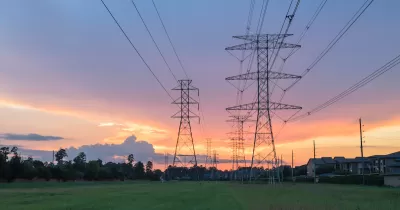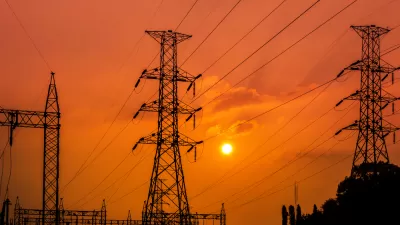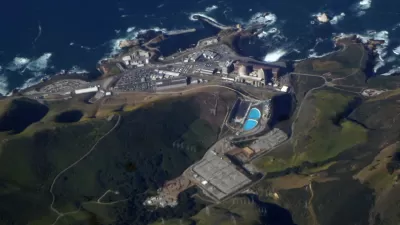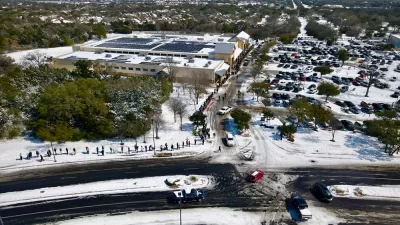Texans will decide on November 7 whether to subsidize electricity generation to strengthen the power grid to prevent blackouts, but only with the construction of new natural gas power plants.

Update November 8: Proposition 7 passed with nearly 65 percent of the vote, according to Ballotpedia.
“TXOGA is pleased to see infrastructure propositions to expand water, electricity and broadband pass with overwhelming support from voters,” said Todd Staples, President of the Texas Oil & Gas Association, referring to Proposition 6 and Proposition 8, as well as Prop. 7, in a statement on November 7. “With an estimated 1,000 people a day moving to the Lone Star State, growing infrastructure is essential to the success of every Texan.”
“Today, voters in Texas will decide whether to provide billions of taxpayer dollars for the construction of natural-gas-fired power plants,” reports Maxine Joselow, chief writer for The Washington Post's Climate 202 newsletter on Nov. 7, Election Day.
The [legislatively referred] constitutional amendment, which is almost certain to pass, seeks to solve the crisis facing the electric grid in Texas, where a 2021 winter freeze killed 246 people and caused millions to lose power. But not everyone agrees it’s the right solution.
[Planetizen coverage of Winter Storm 2021 began on Feb. 18, 2021].
The topic is certainly now a new one—but focusing almost solely on natural gas power is a controversial approach to electricity reliability.
[See: Energy Reliability Vs. the Environment, August 22, 2023]
“Modernization of electric generation facilities”
Voters will not see “natural gas power plants” on their ballots. Voters will be asked in Proposition 7 whether they wish to support the creation of the “Texas Energy Fund and authorize funding to modernize electric generation facilities.”
The proposition carries a $10 billion price tag. Unlike many California ballot measures, which are often funded by taxpayer-supported general obligation bonds, or funding from ratepayers, “[m]oney in the fund would consist of money appropriated by the state legislature; investment returns from the fund; and gifts, grants, and donations contributed to the fund,” according to Ballotpedia.
“While the proposal doesn’t explicitly mention natural gas plants, it would primarily benefit them,” adds Joselow of The Washington Post.
That’s because the loans and grants would be reserved for projects that are “dispatchable,” meaning they can quickly adjust the amount of power they feed the grid.
Gas plants are dispatchable, while weather-dependent wind and solar farms are not. The measure also specifies that giant batteries are not eligible for the loans and grants, even though they are dispatchable — and they played a crucial role in preventing power outages when a punishing heat dome settled over the state this summer.
Funding will be allocated for three purposes:
- Most of that money — about $7.2 billion — would go toward low-interest loans and grants for power projects in the region served by the Electric Reliability Council of Texas, the state’s main grid operator.
- Another $1 billion worth of loans and grants would go to power projects outside ERCOT.
- The remaining $1.8 billion would help pay for microgrids, or small-scale power systems that can operate independently of the grid, at critical facilities such as hospitals.
Ballotpedia excerpted statements from editorials from six major Texas daily newspapers – three in support and three opposed. A sample:
- Houston Chronicle Editorial Board: “Proposition 7 is hardly perfect, but as a sum of its parts it could be an effective bridge solution for keeping our lights on and ACs running. We urge a 'for' vote on Proposition 7.”
- Austin American-Statesman Editorial Board: “With this amendment, the state shows its hand that it is wiling to help one player only — natural gas-powered electric plants, which can harm the environment and be more expensive to operate than cleaner solutions. If natural gas-powered plants are needed, they should be able to get their own financing to build. Vote ‘No.‘”
FULL STORY: Texans to vote on providing billions in taxpayer money for gas plants

Alabama: Trump Terminates Settlements for Black Communities Harmed By Raw Sewage
Trump deemed the landmark civil rights agreement “illegal DEI and environmental justice policy.”

Study: Maui’s Plan to Convert Vacation Rentals to Long-Term Housing Could Cause Nearly $1 Billion Economic Loss
The plan would reduce visitor accommodation by 25% resulting in 1,900 jobs lost.

Planetizen Federal Action Tracker
A weekly monitor of how Trump’s orders and actions are impacting planners and planning in America.

Wind Energy on the Rise Despite Federal Policy Reversal
The Trump administration is revoking federal support for renewable energy, but demand for new projects continues unabated.

Passengers Flock to Caltrain After Electrification
The new electric trains are running faster and more reliably, leading to strong ridership growth on the Bay Area rail system.

Texas Churches Rally Behind ‘Yes in God’s Back Yard’ Legislation
Religious leaders want the state to reduce zoning regulations to streamline leasing church-owned land to housing developers.
Urban Design for Planners 1: Software Tools
This six-course series explores essential urban design concepts using open source software and equips planners with the tools they need to participate fully in the urban design process.
Planning for Universal Design
Learn the tools for implementing Universal Design in planning regulations.
Caltrans
Smith Gee Studio
Institute for Housing and Urban Development Studies (IHS)
City of Grandview
Harvard GSD Executive Education
Toledo-Lucas County Plan Commissions
Salt Lake City
NYU Wagner Graduate School of Public Service





























